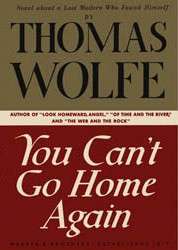You Can't Go Home Again
 First edition cover | |
| Editor | Edward Aswell (edited and compiled work from writings of Wolfe, published posthumously)[1] |
|---|---|
| Author | Thomas Wolfe |
| Genre | Autobiographical fiction, Romance |
| Published | New York, London, Harper & Row, 1940 |
| Pages | 743 |
| OCLC | 964311 |
You Can't Go Home Again is a novel by Thomas Wolfe published posthumously in 1940, extracted by his editor, Edward Aswell, from the contents of his vast unpublished manuscript The October Fair.
The novel tells the story of George Webber, a fledgling author, who writes a book that makes frequent references to his home town of Libya Hill. The book is a national success but the residents of the town, unhappy with what they view as Webber's distorted depiction of them, send the author menacing letters and death threats.[2][3]
Wolfe, as in many of his other novels, explores the changing American society of the 1920s/30s, including the stock market crash, the illusion of prosperity, and the unfair passing of time which prevents Webber ever being able to return "home again". In parallel to Wolfe's relationship with America, the novel details his disillusionment with Germany during the rise of Nazism.[4][5] Wolfe scholar Jon Dawson argues that the two themes are connected most firmly by Wolfe's critique of capitalism and comparison between the rise of capitalist enterprise in the United States in the 1920s and the rise of fascism in Germany during the same period.[6]
The artist Alexander Calder appears, fictionalized as "Piggy Logan."[7]
Plot summary
George Webber has written a successful novel about his family and hometown. When he returns to that town, he is shaken by the force of outrage and hatred that greets him. Family and lifelong friends feel naked and exposed by what they have seen in his books, and their fury drives him from his home.
Outcast, George Webber begins a search for his own identity. It takes him to New York and a hectic social whirl; to Paris with an uninhibited group of expatriates; to Berlin, lying cold and sinister under Hitler's shadow. The journey comes full circle when Webber returns to America and rediscovers it with love, sorrow, and hope.
Title
Wolfe took the title from a conversation with the writer Ella Winter, who remarked to Wolfe: "Don't you know you can't go home again?" Wolfe then asked Winter for permission to use the phrase as the title of his book.[8][9]
The title is reinforced in the denouement of the novel in which Webber realises: "You can't go back home to your family, back home to your childhood ... back home to a young man's dreams of glory and of fame ... back home to places in the country, back home to the old forms and systems of things which once seemed everlasting but which are changing all the time – back home to the escapes of Time and Memory." (Ellipses in original.)[10]
The phrase “you can’t go home again” has entered American speech to point out how human nostalgia is weighted with both an inaccurately positive bias ("Absence makes the heart grow fonder") and an inability to appreciate the changes wrought by time on places and people we remember as static and permanent. In general terms, it means that attempts to relive youthful memories are never as fulfilling as during their initial creation.[11] This sentiment is closely mirrored in the final pages of Marcel Proust's novel Swann's Way, the first installment of his lengthy work In Search of Lost Time.
See also
- No man ever steps in the same river twice
- You Can't Go Home Again (1947): http://gutenberg.net.au/ebooks07/0700231h.html
References
- ↑ "You Can't Go Home Again". OCLC Worldcat. Retrieved 18 December 2013.
- ↑ "You Can't Go Home Again". Magill Book Reviews. 15 March 1990.
- ↑ Strauss, Albrecht B. (Spring 1995). "You Can't Go Home Again -- Thomas Wolfe and I". Southern Literary Journal. 27 (2): 107–116.
- ↑ Godwin, Rebecca (2009). ""You Can't Go Home Again": Does Nazism Really Transform Wolfe's Romanticism?". Thomas Wolfe Review. 33 (1/2): 24–31.
- ↑ Hovis, George (2009). "Beyond the Lost Generation: The Death of Egotism in "You Can't Go Home Again."". Thomas Wolfe Review. 33 (2): 32–47.
- ↑ Dawson, John (2009). "Look Outward, Thomas: Social Criticism as Unifying Element in "You Can't Go Home Again."". Thomas Wolfe Review. 33 (1/2): 48–66.
- ↑ KATHRYN SHATTUCK (October 10, 2008). "From a Big Imagination, a Tiny Circus". The New York Times. Retrieved 1-11-14. Check date values in:
|access-date=(help) - ↑ Fred R. Shapiro, eds. (2006). The Yale Book of Quotations. New Haven, Connecticut: Yale University Press. p. 832. ISBN 978-0-300-10798-2.
- ↑ Godwin, Gail (2011). "Introduction". You Can't Go Home Again. Simon and Schuster. p. xii. ISBN 9781451650488. Retrieved 2013-03-05.
- ↑ Madden, David (2012). ""You Can't Go Home Again": Thomas Wolfe's Vision of America.". Thomas Wolfe Review. 36 (1/2): 116–126.
- ↑ Matt, Susan J. (2007). "You Can't Go Home Again: Homesickness and Nostalgia in U.S. History". The Journal of American History. 92 (4): 69.
External links
- Transcript of interview with Susan J. Matt, To The Best Of Our Knowledge radio